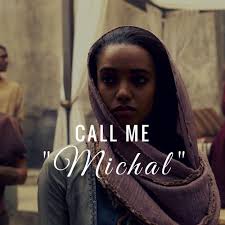Michal
Her name means: “Who Is Like God?”
Her character: A woman of strong emotions, she was unable to control the important circumstances of her life. Forcibly separated from two husbands, she lost her father and her brother, who were savaged by their enemies.
Her sorrow: That she was ensnared in the drawn-out battle between Saul and David.
Her joy: Though short-lived, she enjoyed a passionate love for David.
Key Scriptures: 1 Samuel 18:20-29; 19:11-17; 2 Samuel 6:16-23
Her Story/ part 1
Michal stretched herself across the window’s edge. Leaning out as far as she dared, she could see her husband running through the night shadows, his movements swift and lithe, like a young stag evading its predators. Even if her father, the King Saul, pursued with an army, she was confident he would not catch her David. She had loved the shepherd boy since the day he had calmed King Saul’s troubled soul with his harp playing. After he defeated the hideous Goliath with only a sling and a stone, all Israel fell in love with him. But it was for her alone that David had slain two hundred Philistines—to prove his worth.
She turned from the window, grateful for the chance to have aided her husband’s escape. Quickly she dressed one of the household idols, placing it in their bed and topping it with goat’s hair to make it look like a sleeping David. She was ready for her father’s men when they came pounding on her door. “David is ill,” she told them. So they returned to King Saul, who immediately ordered them back, saying, “Bring him up to me in his bed so that I may kill him.” Discovering the ruse, Saul confronted his daughter: “Why did you deceive me like this and send my enemy away so that he escaped?” Michal lowered her eyes and replied, “He threatened me, ‘Let me go, or I’ll kill you.’”
Nine years or more have passed. Michal glanced out the window, arms folded tightly against her breast, observing the scene below. David, now the King, had entered Jerusalem, leaping and dancing as the ark of the covenant was carried into Jerusalem. He looked ridiculous to Michal, more like a romping goat than a great king. David offered the sacrifices and blessed the people. Then he entered his own house to bless it. But Saul’s daughter met him with scornful eyes: “How the king of Israel has distinguished himself today, disrobing in the sight of the slave girls of his servants as any vulgar fellow would!” “It was before the LORD Yehovah God, who chose me,” he replied, “rather than your father or anyone from his house when he appointed me ruler over Yehovah Gods people Israel—I will celebrate in the presence of Yehovah. I will make myself still more contemptible than that, and I will be humiliated in my own eyes, but those slave-girls you mentioned will honor me!”
Her Story/ part 2
Twice, Michal stood at a window observing David. Scripture paints her as David’s wife, in the latter part as Saul’s daughter. In fact, her attitude is so changed that we feel perplexed, watching her as she watches David. To understand what may have shaped Michal’s heart in the intervening years, we need to find a corridor connecting the two windows, a passageway that somehow led from love to scorn. Michal may have expected her separation from David to be a short one, her idealism forging a happy ending to their fairy-tale love. Perhaps she believed David would find a way to protect her from her father’s wrath. Was she shocked when real life intervened and her father punished her by marrying her to another man? Did her bitterness grow during David’s long absence? Had she finally made peace with her new marriage only to be torn from her husband when David demanded her back after Saul’s death? Did she question Yehovah God’s judgments, identifying more with the dead than the living after her father perished in a desperate battle with the Philistines?
Perhaps Michal’s bitterness swelled to rage when she realized she had always been someone else’s pawn, a mere woman manipulated by powerful men. Her own father used her, promising her to David in hopes she would prove a snare to him. And, finally, one of her brothers handed her back to David after Saul’s death, further legitimizing David’s claim to the throne. A princess, then a queen, she was still a slave.
Michal’s story is tragic. Throughout the difficult circumstances of her life, we see little evidence of a faith to sustain her. Instead, she is tossed back and forth, her heart left to draw its own bitter conclusions. In the last scene with David, we see a woman blind with scorn, making the very mistake God cautioned the prophet Samuel against in his search for a king to succeed the wayward Saul: “Do not consider his appearance or his height, for I have rejected him. Yehovah God does not look at the things human beings look at. People look at the outward appearance, but the Yehovah looks at the heart.” The truth is, Yehovah God is the only one who can see into the depths of anyone’s heart, including Michal’s. He knew everything that had happened, both good and bad. Still the story of Michal seems to indicate that she grew to be more like Saul than like David. As such, she reminds us that even victims have choices. No matter how much we’ve been sinned against, we still have the power to choose the attitude of our heart. If we cast ourselves on God’s mercy, asking him to help us, he cannot refuse. Even in difficulty, he will dwell in us, shaping our own wayward hearts into the likeness of his own.
Her Promise
Michal’s contempt for true worship can be contrasted with David’s love of worship. He worshiped Yehovah God with a true heart. His devotion was so deep, so real, it had to be expressed in the most extravagant praise and in dancing “with all his might.” That’s the sort of worship Yehovah God is looking for from his people Israel, and he responds with a promise to Bless.

0 Comments